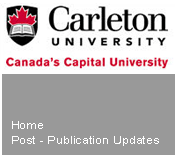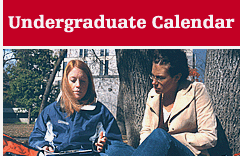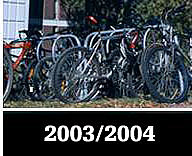



| Admissions | Regulations | Programs | Courses | Officers | The University |
| The Academic Year |
| Electronic Access to the Undergraduate Calendar |
| Accreditation of the University |
| Disclosure |
| Copyright Compliance |
| Fees |
| Selected Senate Policies |
| Map |
 |
 |
 |
 |
|
|
2.6 Deferred Term WorkIn some situations,students are unable to complete a significant term assignment because of illness or other circumstances beyond their control, which forces them to delay submission of the work. If this happens late in the term, it may be necessary for the due date to be delayed beyond the deadline for reporting the course grades.The student should,in the first instance, consult with the course instructor.If a student is unable to submit an essential piece of term work in time for the determination of the final grade, the student may apply for a deferral of the assignment deadline. The application for deferred assignment must:
If the deferral of the assignment is approved, the student will receive the interim notation Def, which will be replaced when the assignment has been submitted and graded. The final dates for submission of deferred term assignments are the following, unless alternate arrangements are made with the instructor: Fall-term half courses: February 1 Fall/Winter and winter term courses: June 1 Summer term courses ending in June: August 1 Summer term courses ending in August: September 15 2.7 Review of GradesWhenever possible, both during the term and after, concerns about the grading of student work should be settled informally between the student and the instructor. The protocols described here are the procedures to follow when this informal process cannot be followed. The outcome of a review may raise, lower or leave unchanged the original grade. 2.7.0 DefinitionsTerm work consists of any assigned course work that is returned to the student on or before the date when the term ends as stated in the official schedule of the University. This date often differs from the last day of classes. Final work is any assessed work received back later than this date. Final work includes, but is not limited to, final examinations. 2.7.1 Review of Grade for Term WorkA request for Review of Grade for Term Work is made to the instructor assigned to the course and the request can apply to any or all assignments, tests and other evaluations. The request must be made within 14 days of the day the grade is available to the student. 2.7.2 Review of Grade for Final WorkStudents may request a Review of Grade for Final Work at the Registrar's Office. The course instructor conducts the Review of Grade for Final Work, or, if the instructor is not available, an alternate qualified reader designated by the Chair or Director.The request for this review normally must be made by January 31 for the fall term, by May 31 for the winter term and by September 30 for the spring and summer terms. 2.8 Appeal of a GradeIf the process of Review of Grade for Term Work or Final Work has not resolved the concerns, or if Review is not appropriate, and where reasonable grounds exist which suggest error in the grade assigned by an instructor, then an appeal of the grade may be made to the Dean of the faculty offering the course. The appeal is specific to the grade on a given piece of work, and more than one such grade may be appealed. The Dean, designated Chair, or Director will assign assessment of the written or equivalent course work to at least one qualified reader other than the instructor. After due consultation, the Dean, as chief academic officer of the faculty, will assign the grade. The outcome of the Appeal may raise, lower or leave unchanged the original grade. The Appeal must be submitted to the Registrar's Office with full supporting documentation within 14 days of the completion of the Review. If there was no Review, the Appeal must be submitted by January 31 for the fall term, by May 31 for the winter term and by September 30 for the spring and summer terms. 2.9 Academic Accommodation for Students with DisabilitiesCarleton University is strongly committed to providing access and accommodation for all individuals with identified and duly assessed disabilities. The University has a Senate- approved policy on Academic Accommodation that forms part of its Human Rights Policy. This policy should be consulted for further information and is available at the front of this Calendar and online at: www.carleton.ca/equity.The policy promotes efforts to accommodate students with disabilities so that they will have the opportunity to meet learning objectives and be fairly evaluated in their performance. In no case, however, does academic accommodation negotiate away, lower, or remove the academic standards and learning objectives of any course or program at the University. The Paul Menton Centre for Students with Disabilities is the designated unit at the University for assisting the Carleton community in integrating persons with disabilities into all aspects of Carleton’s academic and community life. The Paul Menton Centre provides assessment of academic accommodation, advises students on strategies to open a dialogue with instructors and acts as consultant, facilitator, coordinator and advocate in this area for all members of the University community. The Paul Menton Centre provides individualized support services, based on appropriate and up to date documentation, to persons who are deaf or hard of hearing, with learning disabilities, attention deficit disorder (ADD), visual impairments, head injuries, physical disabilities including mobility impairments, or who have psychiatric, other medical or non-visible disabilities. Students are responsible for applying for special services by making an appointment with the appropriate coordinator at the Paul Menton Centre. All requests will be considered on the basis of individual need. Students are advised to come to the Centre early in the term to discuss service requests. Examination accommodations for all tests and examinations (in-class, ITV, or formally scheduled) must be arranged by specific deadline dates. Please consult the Paul Menton Centre for a list of deadlines for all examinations. Accommodation requests not made prior to the specified deadlines will not be fulfilled. 2.10 Academic Accommodation for Students with Religious ObligationsCarleton University accommodates students who, due to religious obligation, must miss an examination, test, assignment deadline, laboratory, or other compulsory event. The University has a Senate-approved policy on religious accommodation that forms part of its Human Rights Policy, available at: www.carleton.ca/equity. Accommodation will be worked out directly and on an individual basis between the student and the instructor(s) involved. Students should make a formal written request to the instructor(s) for alternative dates and/or means of satisfying requirements. Such requests should be made during the first two weeks of any given academic term*, or as soon as possible after a need for accommodation is known to exist, but in no case later than the penultimate week of classes in that term. Instructors will make reasonable accommodation in a way that shall avoid academic disadvantage to the student. Students unable to reach a satisfactory arrangement with their instructor(s) should contact the Director of Equity Services. Instructors who have questions or wish to verify the nature of the religious event or practice involved should also contact this officer. *When a student's presence is required prior to the date on which classes begin (e.g. for field trips or orientation activities), any student who cannot meet this expectation of attendance for reasons of religious accommodation should notify the Registrar's Office in advance. 3. Records3.1 Student Records Information3.1.1 NamesAs the University is committed to the integrity of its student records, students are required to provide either on application for admission or on personal data forms required for registration, their complete, legal name. Any requests to change a name, by means of alteration, deletion, substitution or addition, must be accompanied by appropriate supporting documentation. Upon making application for graduation, students may be asked to provide proof of their name. 3.1.2 AddressesIncorrect address information will delay the receipt of important academic information. Students must notify the Registrar's Office immediately of any change in:
3.2 Records Retention PolicySince 1990 the University has implemented a records retention policy which provides for the destruction of student file folders and their contents after a period of 10 years has elapsed since the last registration. This policy applies to those students who are formally admitted and registered in degree programs. Further information on this policy can be obtained by contacting Records and Registration Services. 3.3 Disclosure of InformationThe Ministry of Colleges and Universities and Statistics Canada require that Carleton University provide to them information pertaining to a student's status and other personal information. Upon registration as a student, one is deemed to have agreed to the disclosure by Carleton University of the student's status and other selected personal information pursuant to any such requirement. 3.4 Student StatusWhen responding to a legitimate request from an external agency, the following definitions are used:
|
||||||||||||||||||||
|
©Carleton University 1125
Colonel By Drive, Ottawa, Ontario K1S 5B6 Canada |
||